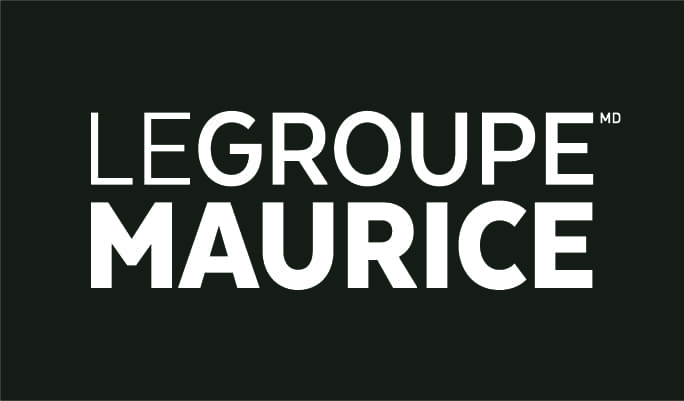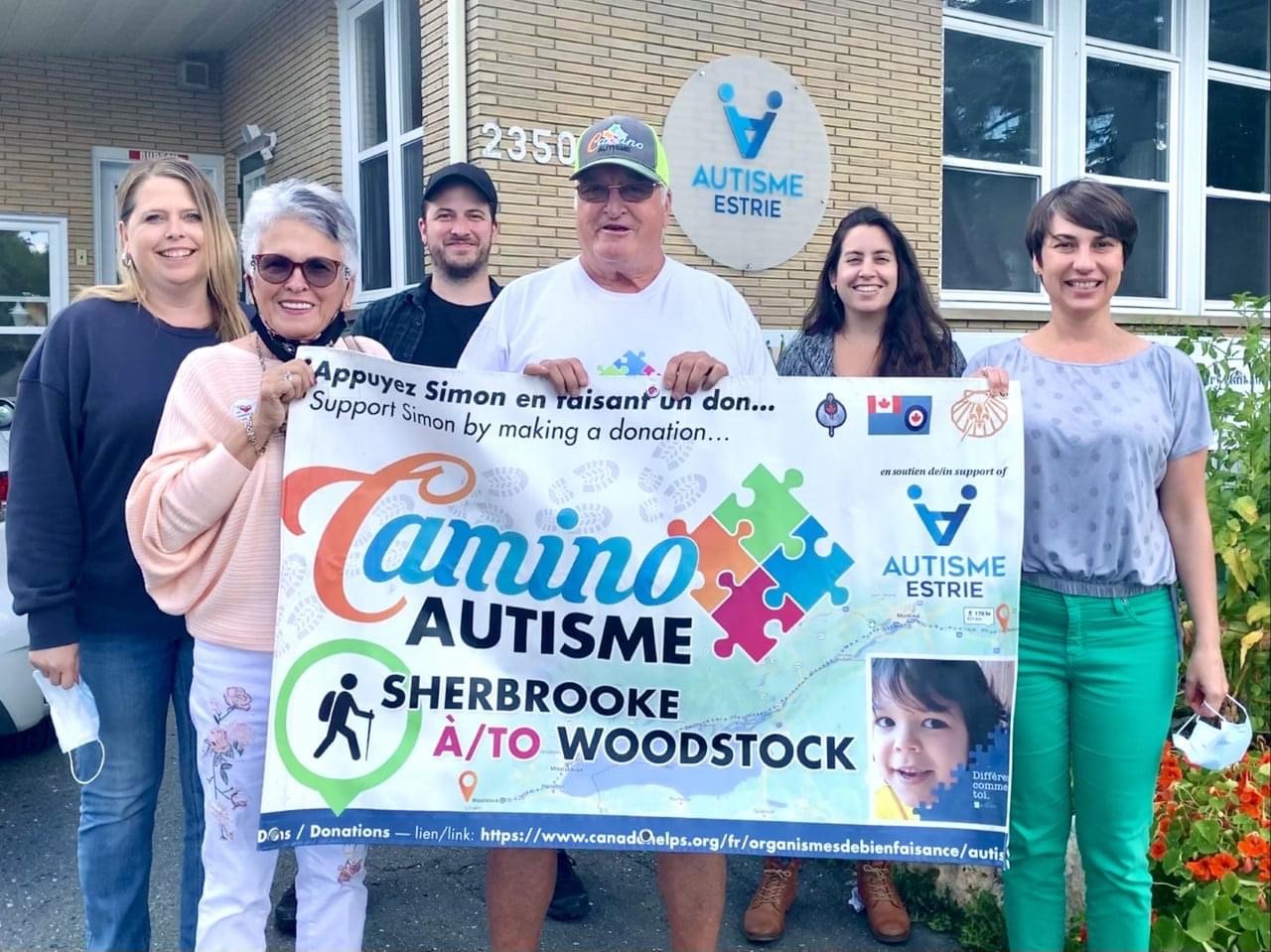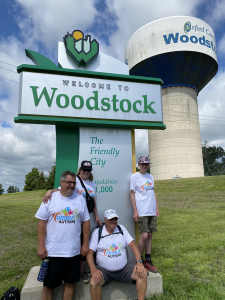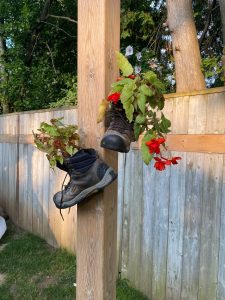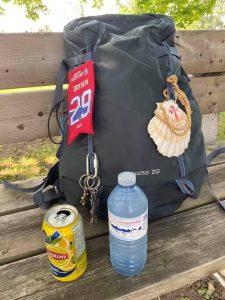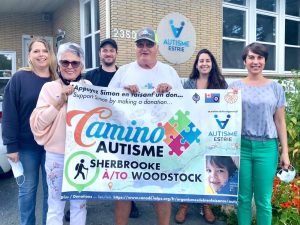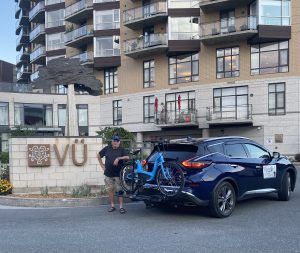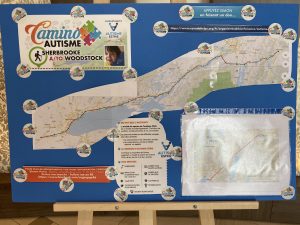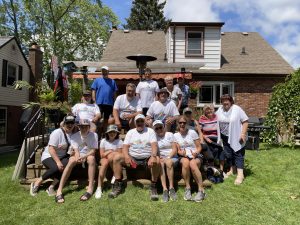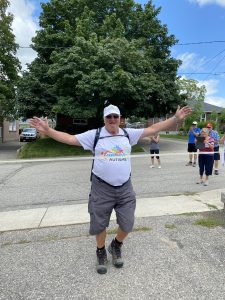Camino Autisme: Le Groupe Maurice resident walks for a good cause
|Volunteer work
Getting involved in a cause you care about is a cause for praise and joy—especially when it also makes a real difference in people’s lives! Simon Patry, a 76-year-old retiree who lives at the VÜ residence, proved this when he took up his Camino Autisme challenge. In June 2021, the Royal Canadian Air Force veteran travelled 814 km on foot in only 40 days to raise funds for Autisme Estrie, an organization that supports people living with autism spectrum disorder. We spoke to the passionate traveller and adventurer about his inspiring journey for a good cause.
Mr. Patry, can you tell us what inspired you to take up this challenge?
It came about after a long period of reflection. The main factor that led to my decision was the pandemic. It had been nearly two years since I’d seen my children. And since I love walking, I decided it was time to visit my son, who lives in Woodstock, Ontario. I had done the Camino de Santiago pilgrimage several times, but at the time it was impossible to go back to Europe because of the restrictions. So I decided to follow my own camino (path), which I named Camino Autisme.

Why did you choose to support people with autism?
My wife Claudette’s grandson has level 3 autism. At age 9, Edwart is different from other boys his age because he’s non-verbal, among other things. I believe that Autisme Estrie is an important organization because it supports children with autism like Edwart at respite care centres and regularly helps parents in order to contribute to the wellbeing of families and persons living with autism.
How did you raise funds for the organization?
I made placards and business cards to explain what I was doing. The cards contained all the details and information on how to make a donation. The placards showed my route: one was attached to my vehicle and the other was at the VÜ residence. Every day, my wife placed a thumbtack on the placard so the residents could follow my journey. I also had a “Camino Autisme” t-shirt to identify my cause and an application that tracked my route. In addition to the funds raised during the walk, the Luc Maurice Foundation donated $3,000 to support my cause. I’m very grateful for that contribution.

How did you prepare for the challenge?
Everything was planned out! My goal was to walk approximately 20 km a day. At around 6:30 in the morning, I’d take my car and drive 20 km. Then I’d park my car and get on my electric bike to return to where I started. That allowed me to warm up, and then I’d start walking. Depending on the heat, it would take me between 5 and 6 hours. Once in my vehicle, I’d drive back to get my bike, and then I’d return for the next leg of the journey. I often stayed in cities so I could rest, talk to people and eat at a restaurant. At night, I slept comfortably in my vehicle. It was all planned to the last detail! I left on June 22 and I arrived at my destination on July 30.
In your view, what’s necessary to complete this Camino Autisme challenge?
You need endurance and willpower. And it helps if you enjoy walking. Personally, I’ve always loved it.
I served in the Canadian air force, so I’ve always covered long distances on foot and I’ve travelled a lot. I used to run, but I had knee surgery in 2013. In spite of my two titanium implants, I continue to walk between 8 and 10 km every day, even in winter!
You also need good shoes. I’ve worn the same style of boots for years. The ones I used for the challenge have already walked 1,200 km! At the end of the walk, my son hung them on a post in his yard and put flowers in them. There’s still there this year!

You must be fuelled by adrenaline! How did you feel when you completed your 800 km walk?
I felt proud! My initiative raised approximately $14,000, including the $3,000 contribution from the Luc Maurice Foundation. With this money, Autisme Estrie will be able to renovate the kitchen at its respite care centre.
I regularly raise funds for them. On the third Saturday of each month, I make and sell inuksuks. All the proceeds from the sales go to the organization.
Do you plan to do a similar challenge again?
Yes, I think so.
My daughter lives in Winnipeg, so why not pay her a visit—by walking there?
This time, I’d like someone to join me. On the road, you have time to think about what you want, contemplate the landscape and enjoy nature. But it’s also nice to have another person to talk to and share the experience with. I’d also like to do the Camino de Santiago again.
Do you have a funny or interesting story from your Camino Autisme journey that you’d like to share with us?
Besides the birds, the deer and the bear that I encountered on the way, I was surprised to find envelopes with money on my windshield. People in Ontario were particularly generous. The placard on my car explained what I was doing, and they left their donations on my vehicle. When I’d stop to take a break, people would approach me to talk about what I’m doing. In total, I collected more than $1,500 in cash!
 Congratulations! It’s wonderful to see that it’s possible to receive so many donations like that. What happened when you arrived at your destination?
Congratulations! It’s wonderful to see that it’s possible to receive so many donations like that. What happened when you arrived at your destination?
For the final 12 km of my journey, my family arrived to join me. My sister, my cousin, my children and my grandchildren were all there to complete the final stretch with me. My son even put up a ribbon in his yard to mark the finish line. I wasn’t expecting it! There were so many great memories. People thought I was crazy at first, but I proved that I was determined. I did it for my enjoyment and to support a cause that’s close to my heart. To meet the challenge to walk 814 km, I simply went at my own pace. I believed I could do it. You can do anything if you believe in yourself.
Thank you so much for sharing this inspiring story, Mr. Patry! We hope your experience will be an inspiration for many. We wish you success with your future challenges. Keep it up!
To find out more about autism spectrum disorder, visit the website of the FQA (Quebec Federation for Autism). If you’d also like to support the cause, consider making a donation to the FQA or to an organization operating in your region.
